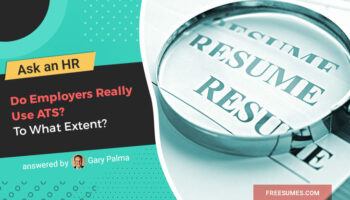Being terminated can be a delicate matter to manage, but there are ways to balance being honest and leaving a good impression.
Each week, we answer your most burning questions about job search, interviews, and career. Have a question for an HR but haven’t had the chance or courage to ask? Just tweet it to @freesumes with the hashtag #AskAnHR and we might feature your question and your tweet in our next Ask an HR edition.
Without further due, here is this week’s question:
What to put on an application for leaving your job if fired?
Your application
Often a resume lists the start and end dates of employment. If your job ended within a short time frame, this would be a flag that something occurred. They will, at the very least, assume the role or organisation was the wrong fit for you. It won’t, however, indicate who ended the employment relationship. If you specify the reason for leaving after every role listed, you can write ‘job came to an end’ or something similar rather than blatantly saying fired. The hiring manager will read between the lines and probe in the interview. Regardless, ‘why did you leave your last role?’ is a common question in any interview, so you should prepare your answer.
Stick to the facts
Being fired can be emotional and disappointing. Try to keep your emotion about the situation out of it and focus on the bare facts. Under no circumstances should you speak negatively or inappropriately about your past employer. If your termination was related to the company culture or clashes with management, phrase this carefully.
Talk about your achievements
Acknowledge that you were fired but move on. Talk about what you did like about the role. Include positives about the workplace and highlight some key achievements. Perhaps you consistently reached a sales target or you got out of your comfort zone, and while it wasn’t a great experience, it was good to try something different.
Discuss what you have learned
People make mistakes. No employer is going to believe you are perfect. While being fired sounds negative, you can be reflective when discussing what didn’t work. Be clear on where you may not have met expectations and talk about what you have done since to help bridge that gap or how you may handle that situation now, once you have these learnings. Refer to things that appealed to you about the job you applied for and how it differs from your previous one. Help to ease the interviewer’s mind that there will be similar concerns.
Be brief
You do not need to share the whole story. Resist the urge to have a complete retelling of the situation and save that for your friends. Practice your response and prepare a summary that provides high-level information. Touch on what went wrong and how you would act if faced with a similar situation in the future.
Remember your reference checks
Most employers do reference checks, and they will likely want to talk to the employer about why you were fired. You will be grateful you stuck to the facts, and it is best if both accounts are the same. Don’t give a prospective employer any reason to doubt you. Use this as a way to reinforce your credibility and integrity.






